Learning Objectives
- To understand socialization in nursing profession and its impact on the outcome of healthcare practices.
- To know the responsibilities and values of nursing professionals in the context of socialization.
- To identify ways through which socialization is achieved in nursing as a profession.
- To determine avenues and skills through which professional nurses can help new practitioners in the field to integrate fully in the duties.
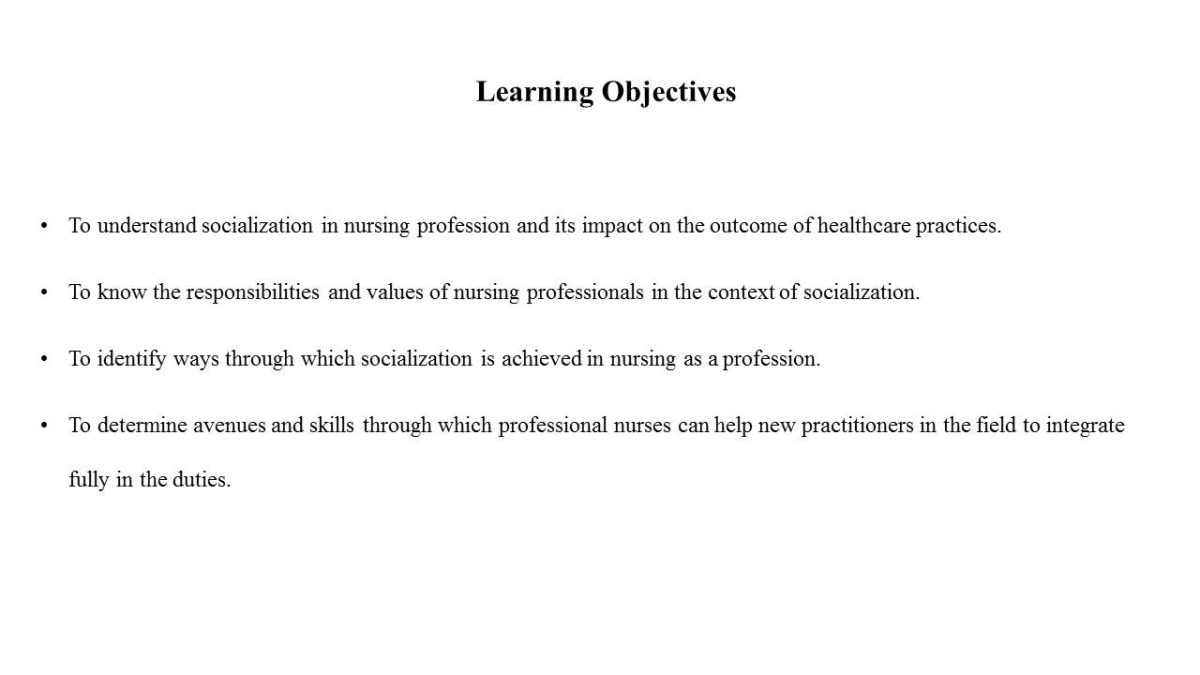
Socialization in a Profession
Socialization in a profession refers to the process of insights and skills acquisition, and getting to identify oneself with area of specialization.
During socialization, learners get to develop traits, beliefs, rules, attitudes and standards which are essential for his or her success while on duty (Masters, 2018).
The behavior of an individual gets to align with the requirements and ethics within the line of profession.
Thus, the major objectives of socialization in a given career are (Maginnis, 2018):
- To achieve maximum integration of professional duties or roles into life responsibilities.
- To gain understanding and internalize the culture associated with the working environment.
- To learn technical skills and new insights required for success in the profession.
- To identify at personal level, versions of the duties being executed, accept them and maximize efforts in fulfilling their objectives.
Alternatively, socialization can be referred to as a process of formation which lead to competency development.
Gradually, socialization yields a different perspective of how an individual perceive matters.
Moreover, it cultivates the capacity to apply intellectual understanding and critical thinking in finding solutions to problems arising in the areas of profession (Maginnis, 2018).
Eventually, an individual become transformed from an average person to tactful and innovative practitioner with the ability to serve clients with respect.
During socialization, trainees in nursing profession merge from behaving like a nurse into being a fully skilled healthcare practitioner (Masters, 2018).
One gain a professional identity as a nurse through training processes in formal education reaches the climax of competent personnel in the field of practice.
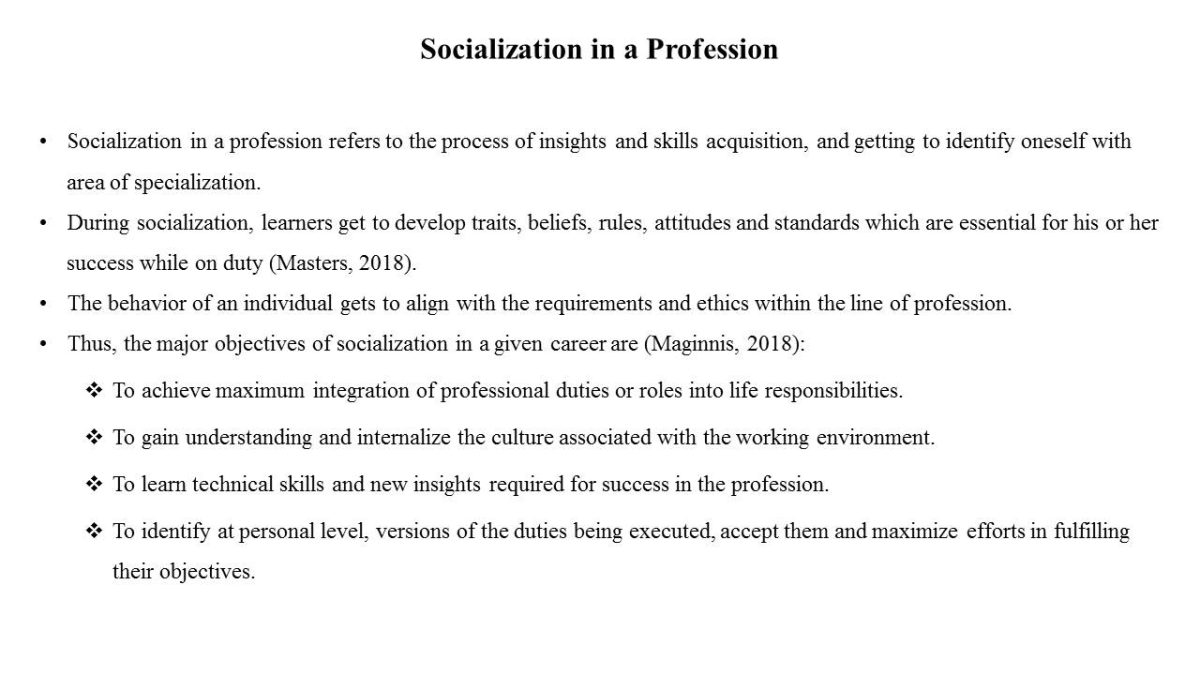
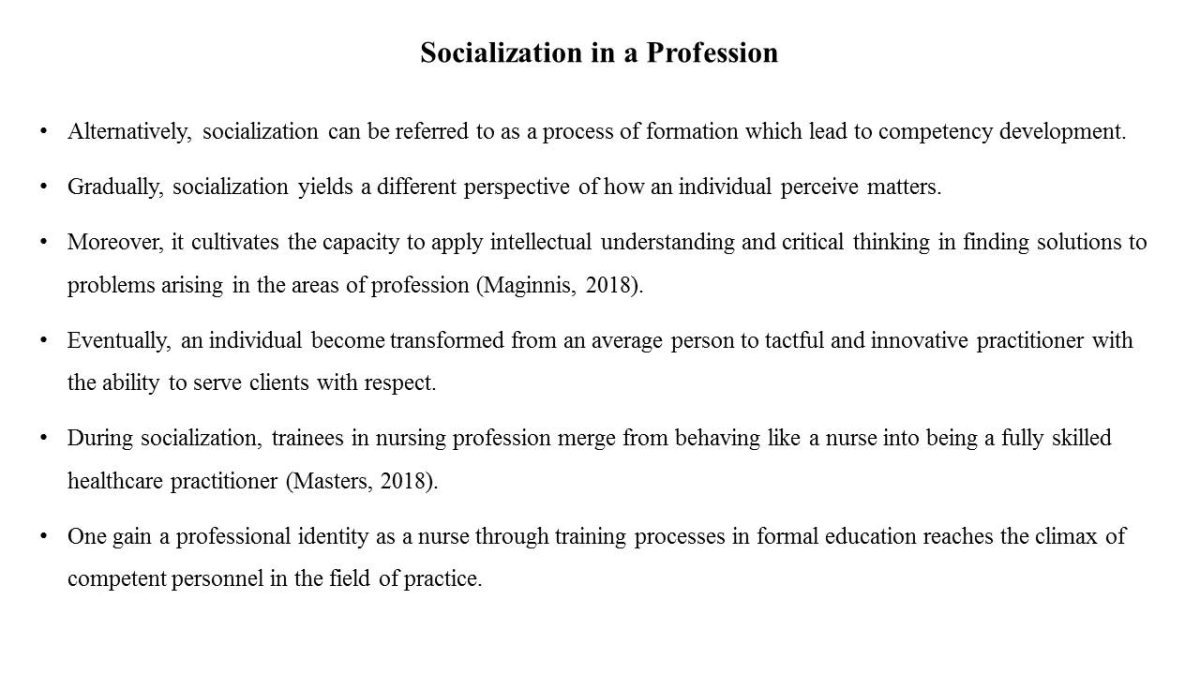
Socialization in Nursing
- In nursing, socialization necessitates being familiar with the roles and responsibilities, and values to uphold while in the field of practice.
- It implies the sphere of nursing profession seeks to answer questions described as “when,” “where,” “why,” “who,” “what,” and “how” in the context of offering healthcare services (Maginnis, 2018).
- Through socialization, a nursing trainee get ensconced into the commanding standards set automatically by the requirements of the duties of a skilled nurse.
- Two aspects nursing standards are referred to while evaluating a fully formed nurse, which are:
- The regulations set to be fit as a professional nursing practitioner. Basically, they involve issues associated with the process of taking care of patients in the hospital (Masters, 2018).
- The evaluation criteria used to ascertain performance index as a competent nurse while on duty. These, entails behaviors and traits which all nurses are obliged to meet while serving clients.
- A well-formed or fully socialized nurse exhibits capacity in the major feature of nursing as a profession.
- The features encompasses:
- The ability to offer healthcare services with consistency and in a loving manner which enhances healing of patients from their ailments.
- The capacity to pay attention to diverse experiences and respond to illnesses and health conditions of patients in both social and physical environments (Masters, 2018).
- The competency of integrating evaluation criteria with in-depth understanding acquired from the experiences with patients and specific category of persons.
- The capacity to use scientific principles of diagnosis in examining patients to administer treatments and monitor progresses of the health condition.
- Thus, socialization in nursing profession imparts skills and critical thinking in trainees to achieve high performance in clinical practice for human well-being (Maginnis, 2018).
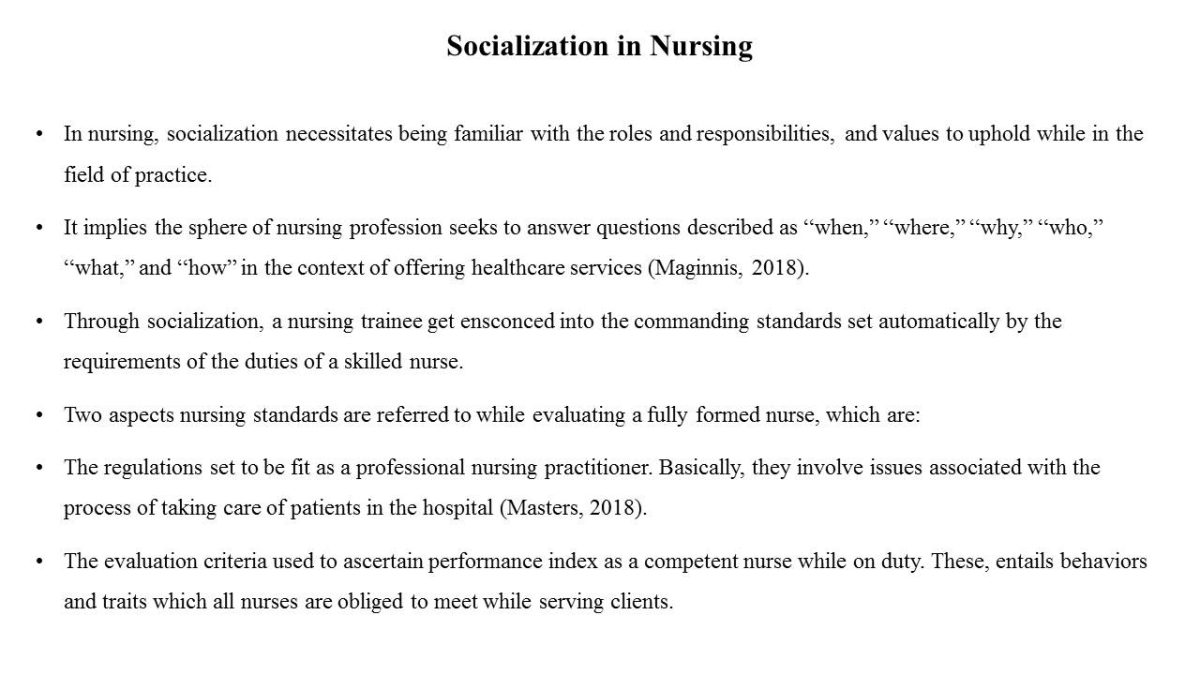
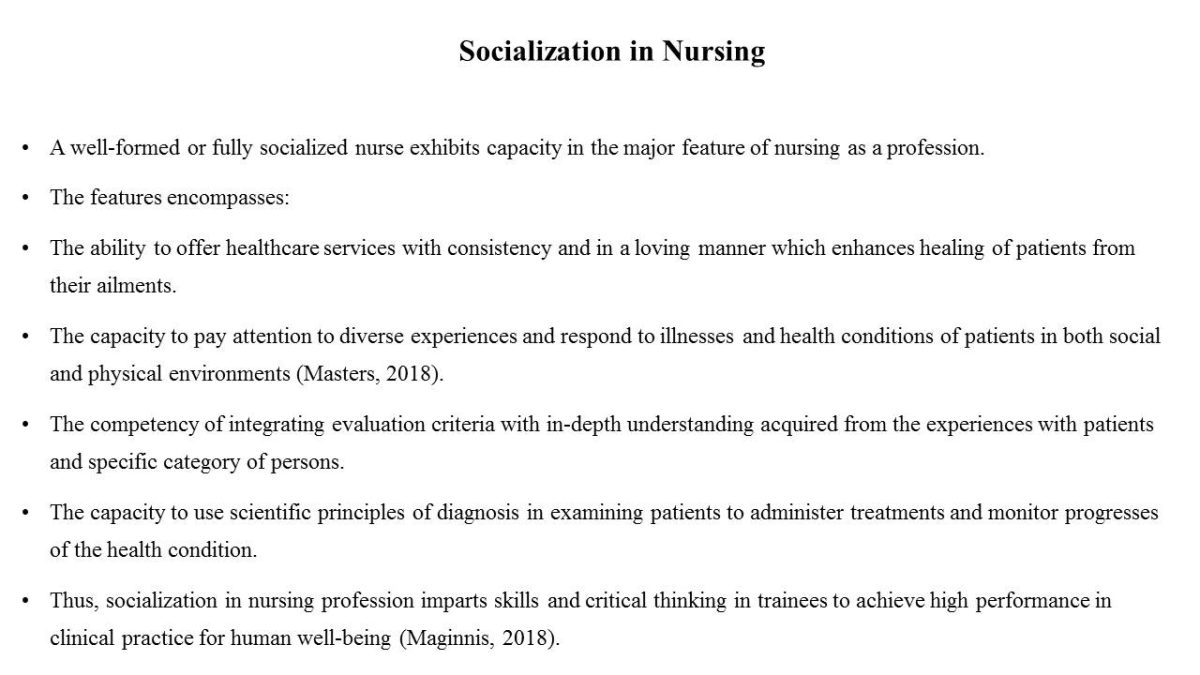
Roles and Values of Nurses in Socialization Context
- As stated initially, socialization in nursing yields competencies necessary for success while engaging healthcare practices.
- Thus, it is essential to for nurses to know their responsibilities and roles as a fully formed or socialized practitioner.
- It is essential for nurses to know that they are advocates for patients’ life in the healthcare system.
- Nurses engage in caring for patients directly or indirectly and educates them on measures and standards to implement for sustaining good health (Masters, 2018).
- As advocates for patients’ wellness, nurses form part of the healthcare professional teams, which handle complex disease conditions beginning from the general wards to high dependent and intensive care units.
- Moreover, nursing is an independent discipline in the healthcare system which function autonomously and accounts for the duties executed while in service.
- Therefore, it is essential for nurses to ensure integrity of their professional identity and accounts for the image displayed by discipline in the society (Maginnis, 2018).
- Nursing profession require soft skills and proficiency in knowledge based healthcare service provision to patients.
- It is essential for nursing professionals to enhance skills for assessment, and augment their competencies through good communication, and discernment.
- Moreover, professionalism in nursing requires cultivation of moral values and work ethics for better healthcare practices.
- The values are beliefs and guidelines which are considered ideal for enhancing interactions in the environment of practice (Maginnis, 2018).
- Mainly, the reflection of good work ethics is noticed by patients being cared for, teammates, professionals in other disciplines within the healthcare system, and the public.
- The values are developed from the beginning of formal education in nursing to the environment of healthcare service throughout to retirement of a practitioner (Masters, 2018).
- Thus, professionalism in nursing requires practitioners in the discipline to uphold its values.
- Code of Ethics policy by the American Nursing Association outline values that all nursing practitioners should cultivate in their entire career life.
- Foremost is the commitment to public service in which healthcare practices are to ensure that public wellness is achieved through nursing. It follows the origin or nursing profession based on the societal need which was to be met by taking care of sick people (Masters, 2018).
- Nurses should be autonomous while executing their duties in caring for sick individuals. The professionals should be decided and accountable for the tasks executed.
- Moreover, nursing professionals should commit to lifetime learning as an avenue of offering knowledge-based services and implementing innovation in the healthcare system.
- Nurses should also believe in the worth and dignity of people, including patients, other professionals and the society as a way of embracing the value of services they offer (Gazaway et al., 2019).
- Thus, all nursing professionals and trainees should be familiar with their roles and values which are essential for better healthcare service.
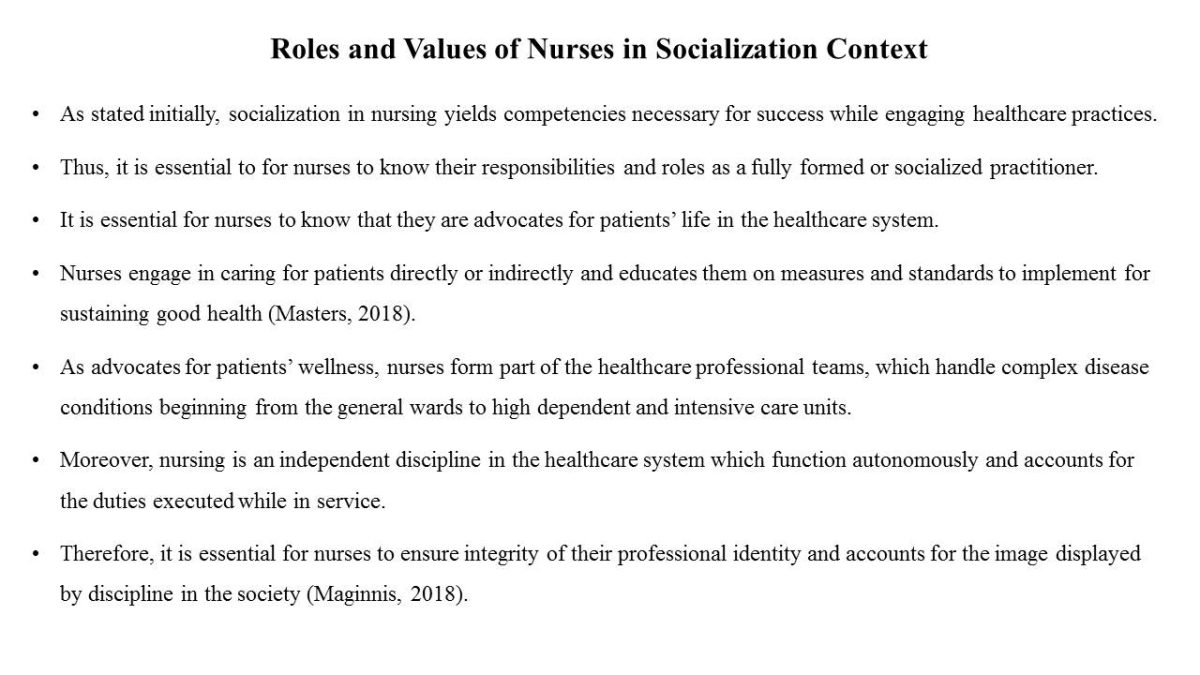
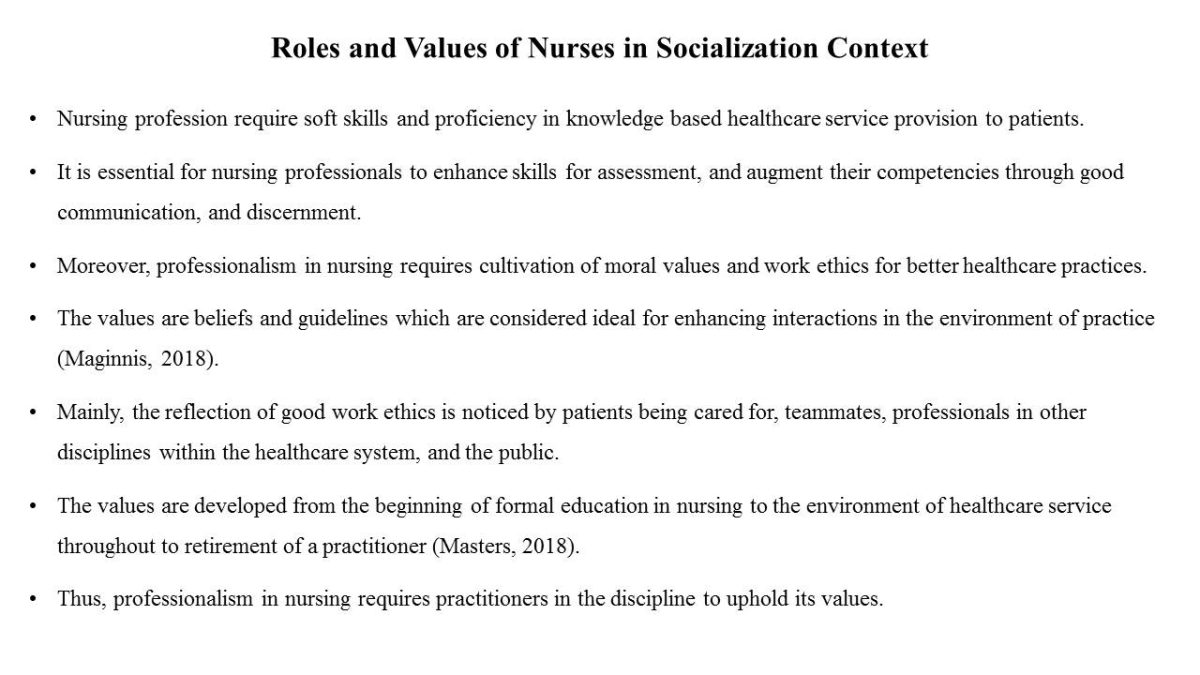
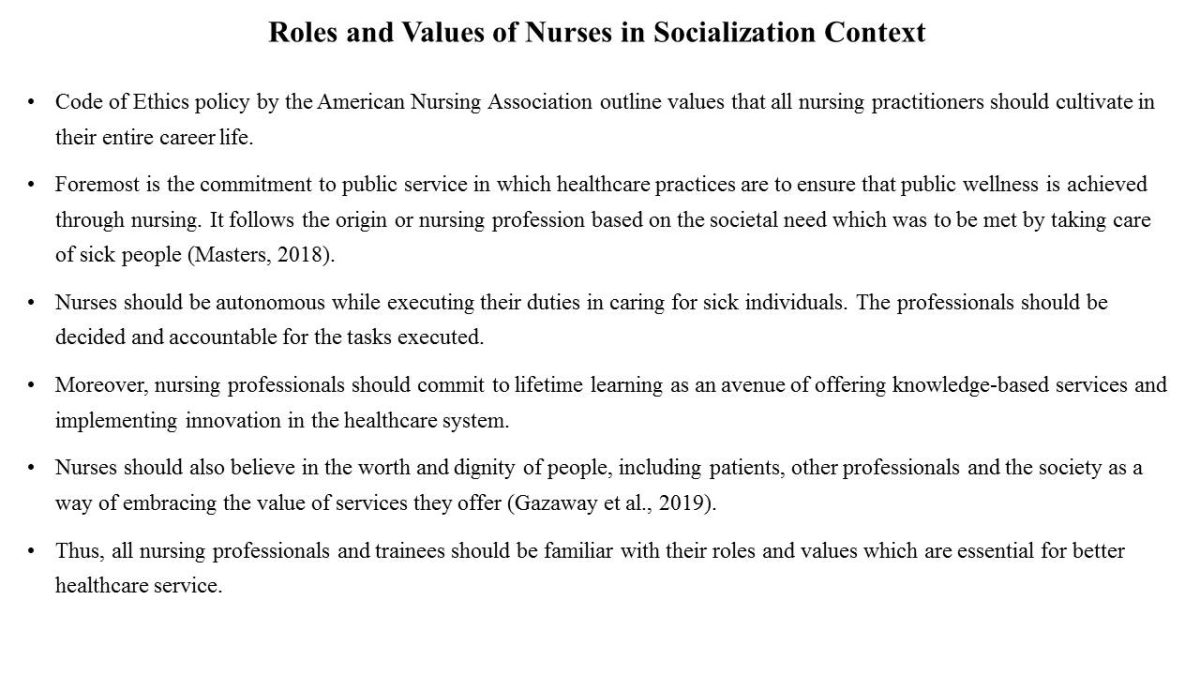
Ways of Achieving Socialization in Nursing
Socialization, generally, refers to adapting the culture of a nursing career and becoming fully integrated in the discipline.
The process of socialization begins during the academic life as a degree student in nursing. It then progresses at the time of hospital attachments for healthcare shifts and continues through the career life of a practitioner (Masters, 2018).
There are two major ways of achieving socialization in nursing profession, which are (Gazaway et al., 2019):
- Formal education in academic environments like university and other institutions of higher learning.
- Formation in the profession ground where competencies are developed and new skills are acquired as a person continues to offer services in the healthcare system.
Thus, in-depth understanding of ways through which nurses achieve socialization is necessary to help in guiding new practitioners in the field.
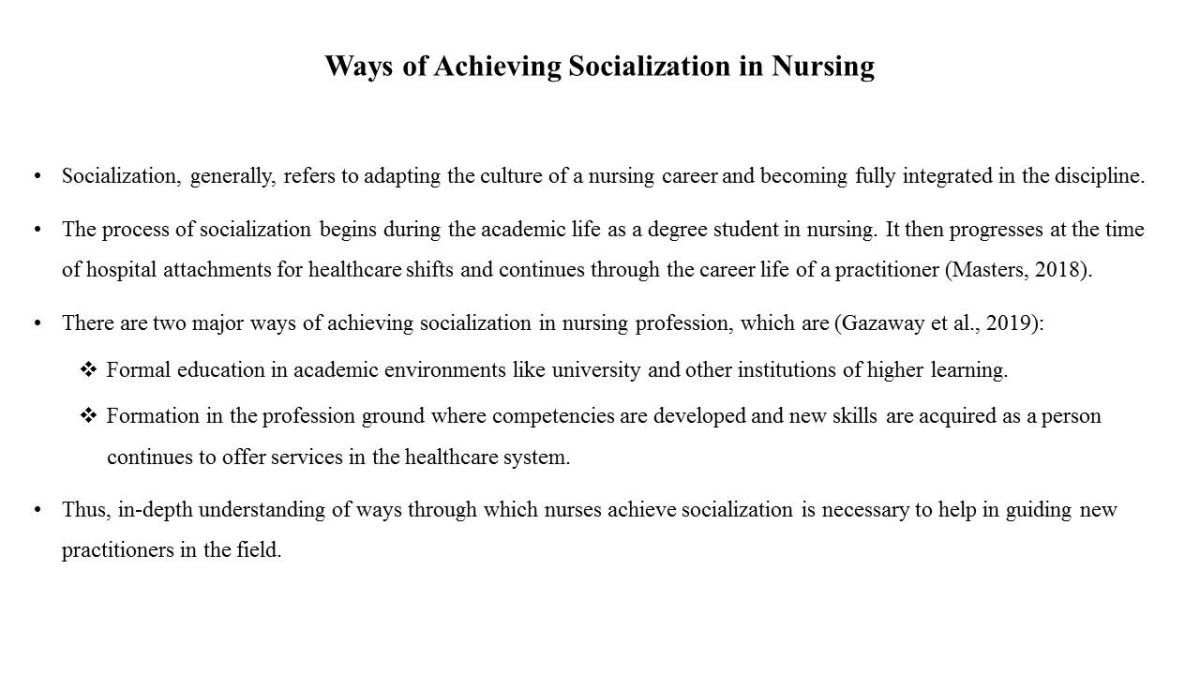
Socialization through Formal Education
- The skill development in nursing profession is begins intellectual training grounds, which are the universities and colleges of higher learning.
- During socialization, cognitive skills are acquired as the students get new insights in class and practical environments.
- The process of transformation from student into a competent practitioner encompasses four main stages of development:
- Initially, the student completely rely on external sources of information like books and tutors for knowledge and in-sights. It is referred to as unilateral dependence as one correct answer is sought for by the learner (Masters, 2018).
- At the initial stages, candidates does not question the information obtained from the lecturers and instructors. However, as deep understanding gets cultivated, the knowledge from experts get subjected to questions.
- The second phase of socialization entails independence, in that, trainees begin to withdraw from external dependence and get into self-reliance (Gazaway et al., 2019).
- At this stage, nursing students abide by judgements from the insights acquired and questions the information from instructors critically.
- The third stage of socialization in nursing is mutual dependence. The trainee ceases to depend on self-gained insights and seek for further understanding of concepts from tutors and classmates.
- At this stage, cognitive skills are developed to empathize with other people and consider their worthiness.
- The knowledge and insights acquired are employed in practice and evaluation to make judgements.
- Intellectual competencies are developed during mutual learning as mind gets engaged in active learning and critical thinking while seeking to solve problems (Gazaway et al., 2019).
- It is easy for the mentors to help students link the theory of nursing with practical aspects of healthcare services.
- Finally, the student merges into interdependence stage where there is not reliance on mutual or self-centered learning.
- It is attributed to expertise in profession, where the trainee easily reflect on the experiences and continue to learn while in the field of practice (Masters, 2018).
- Competencies are developed in many areas nursing profession to help in offering services to patients.
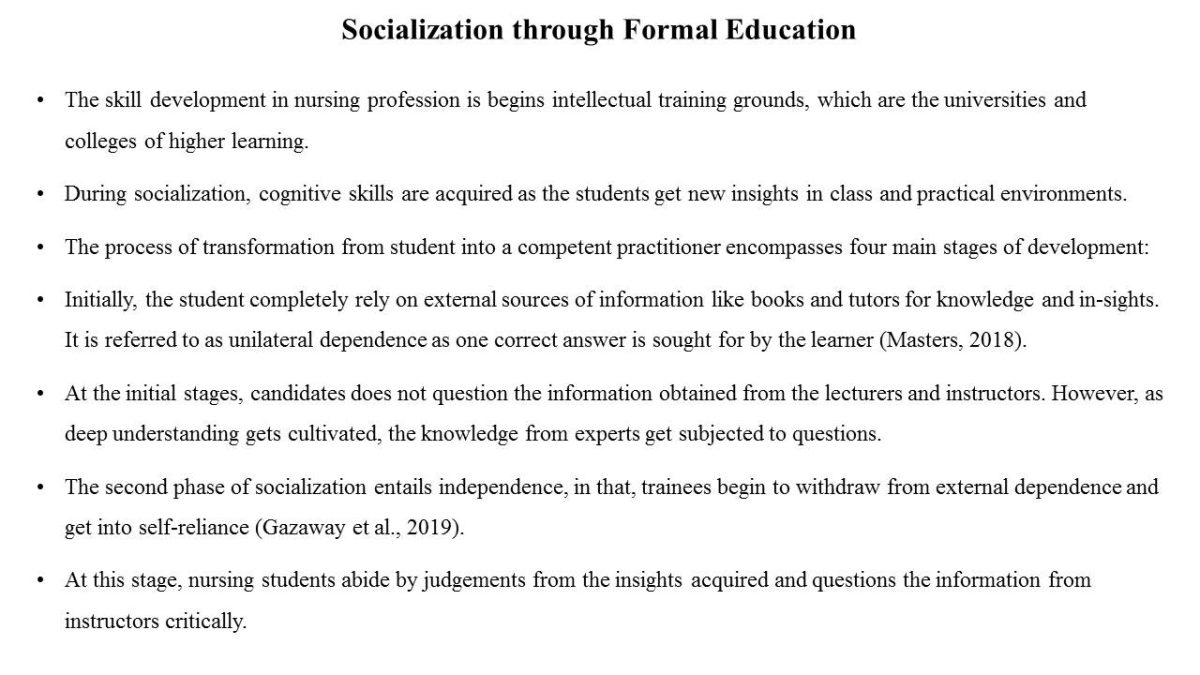
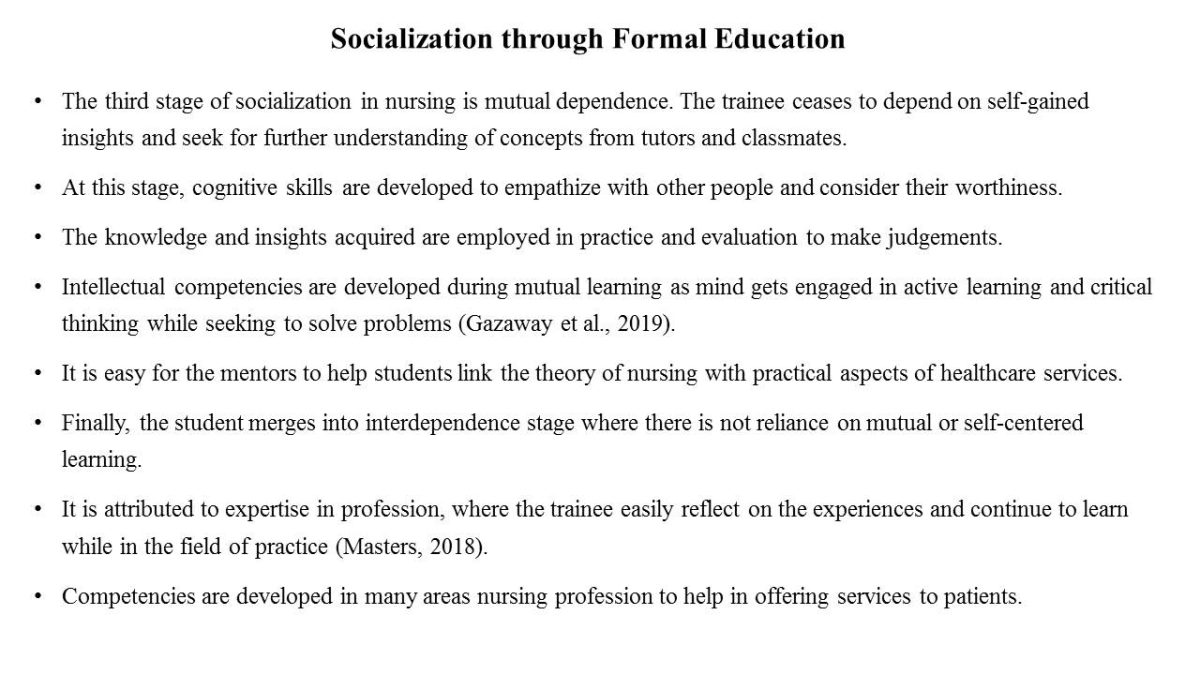
Socialization through Profession
- Socialization into the discipline of nursing entails acquisition of new skills and technical understanding in the field of practice.
- Professional formation depend mostly on the experiences in practicing as a nurse.
- Initial stage of socialization through profession novice, attributed with lack of experience. Learners follow the guidelines and set rules in making judgements in healthcare environment (Gazaway et al., 2019).
- Trainees then progresses to advanced beginner level in which autonomous judgements are made following little understand as to why some procedures are performed the way they are.
- However, formulating solutions to complex situation still become difficult to go through.
- The stage of competency follows in which the nursing practitioner can evaluate a situation based on the principles behind them and make priorities while trying to execute difficult tasks (Masters, 2018).
- Finally, an expert nurse who is able to defy odds of practicing rules and get governed by the wealth of knowledge and experience is formed.
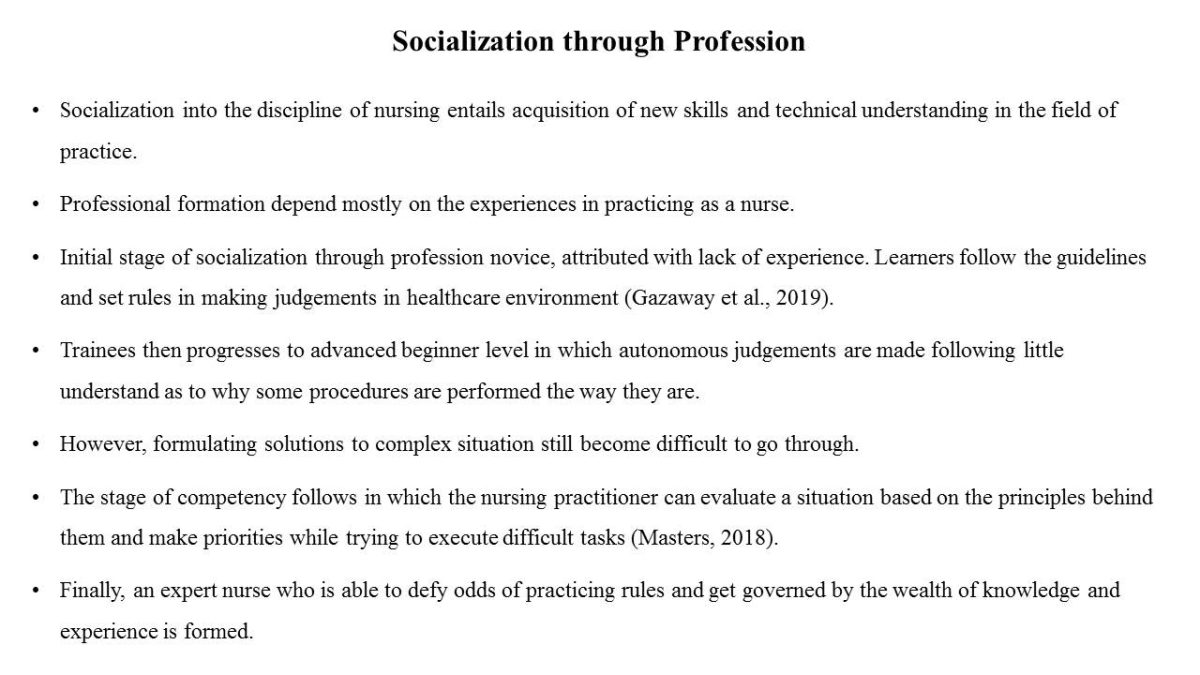
Professional Nurse’s Role in New Practitioners Socialization
- Professional socialization necessitates acquiring new technical skills, adapting to culture in the working environment, internalizing roles in a personal way and fixing the duties in lifetime responsibilities.
- Moreover, theoretical and practical knowledge from scientific research is not enough for nurses since the work environment is associated with emotional reactions (Gazaway et al., 2019).
- Thus, being ideal is a significant aspect for nurses to consider while pursing success in their career.
- Often, the trained nurses get shocked by the extreme variations in classroom and hospital environment.
- Bridging the gap between life in academic and work environment requires inputs from professional nurses to new practitioners in the same field (Masters, 2018).
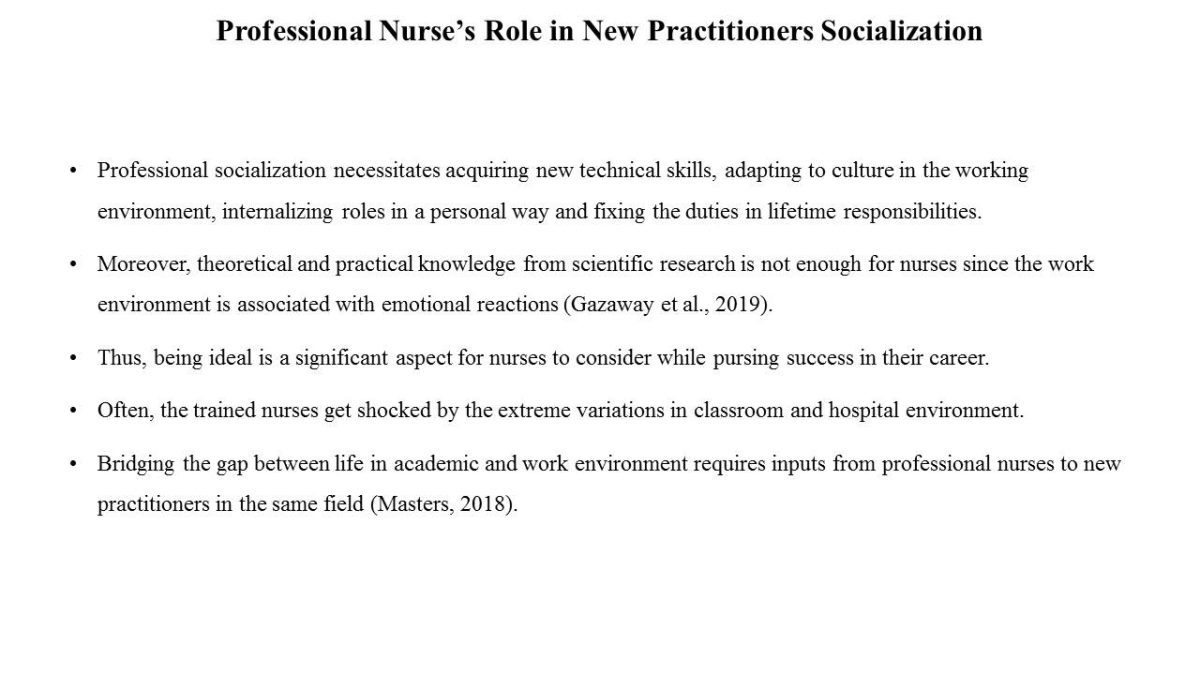
Monitoring New Nurses by Professionals
- Participation in the externship and internship programs allow for assimilation of new nurses into the working environment.
- Professional nurses should constantly link with the training institutions to provide opportunities for nursing trainee to have prior experience of what the life in hospital has for them (Masters, 2018).
- Students easily get ensconced in the real world situation, an environment away from active reading and more to deep understanding and practice.
- As the trainees get familiar with work ethics, professional values and standards set for performance evaluation, they begin to transition from academics to active learning and practice in hospitals (Gazaway et al., 2019).
- Professional nurses should take it as a sole responsibility of initiating the transition of new nurses from academics to work, by offering externship training for them to become their co-workers.
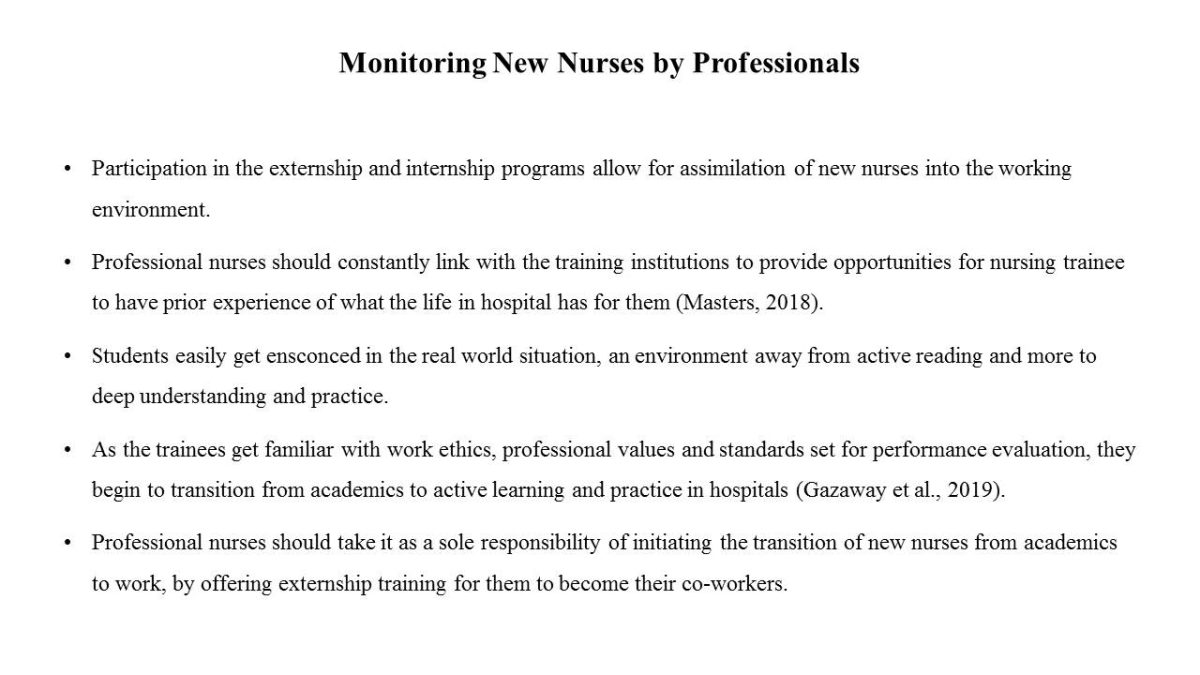
Organizing Competency Based Training by Professionals
- Formalized programs for residency training are organized by hospitals and healthcare organizations for nurses to facilitate their recruitment into the job environment.
- However, building the confidence of new practitioners requires developing in them a sense of being honored as part of the team (Gazaway et al., 2019).
- It is during thee residency period that new nurses interact informally with teammates and other colleagues, thereby, realizing the goodness of working together.
- It requires the efforts of professional nurses to organize for competency based training and allocate specific times for implementing quality assessment modules during residency (Masters, 2018).
- New nurses easily master the soft skills of reflection and creative thinking which are essential in providing holistic healthcare support to patients.
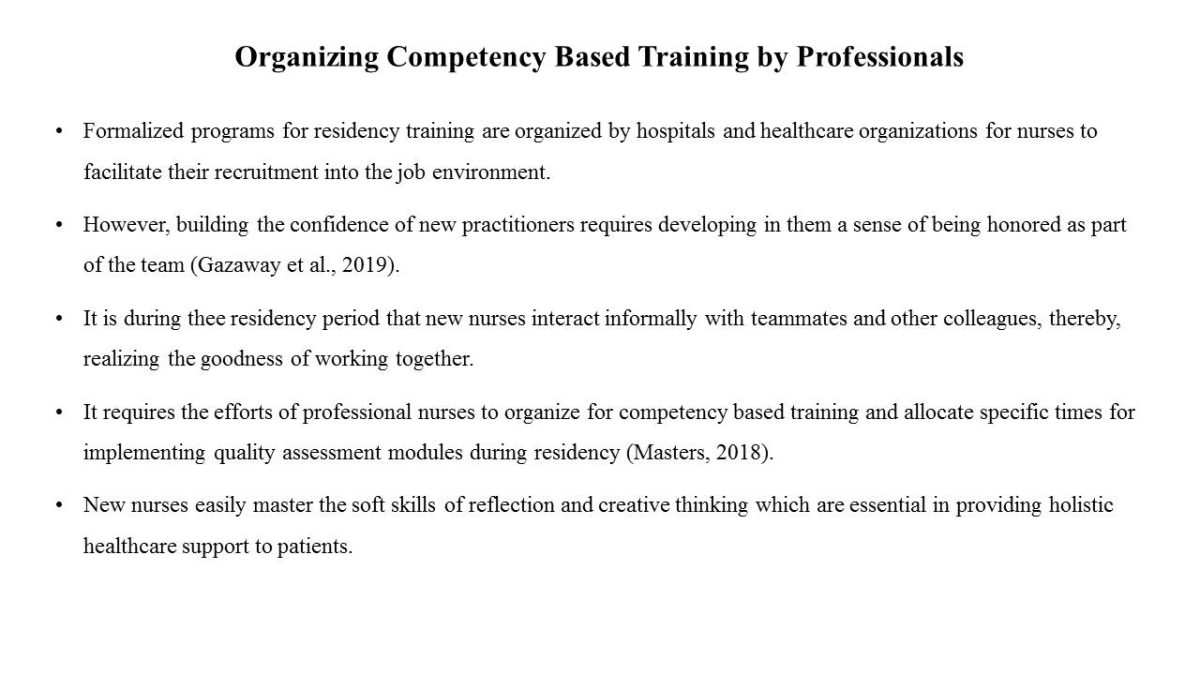
Conclusion
- Professional socialization is essential for achieving competency in the working environment by new nurses.
- It is essential to help trainees understand their responsibilities and values they have to uphold at work place.
- Through formal education and practice in the working environment, nurses easily get integrated into the work environment.
- However, further efforts from professional nurses are necessary for imparting competencies and soft skills in new nurses.
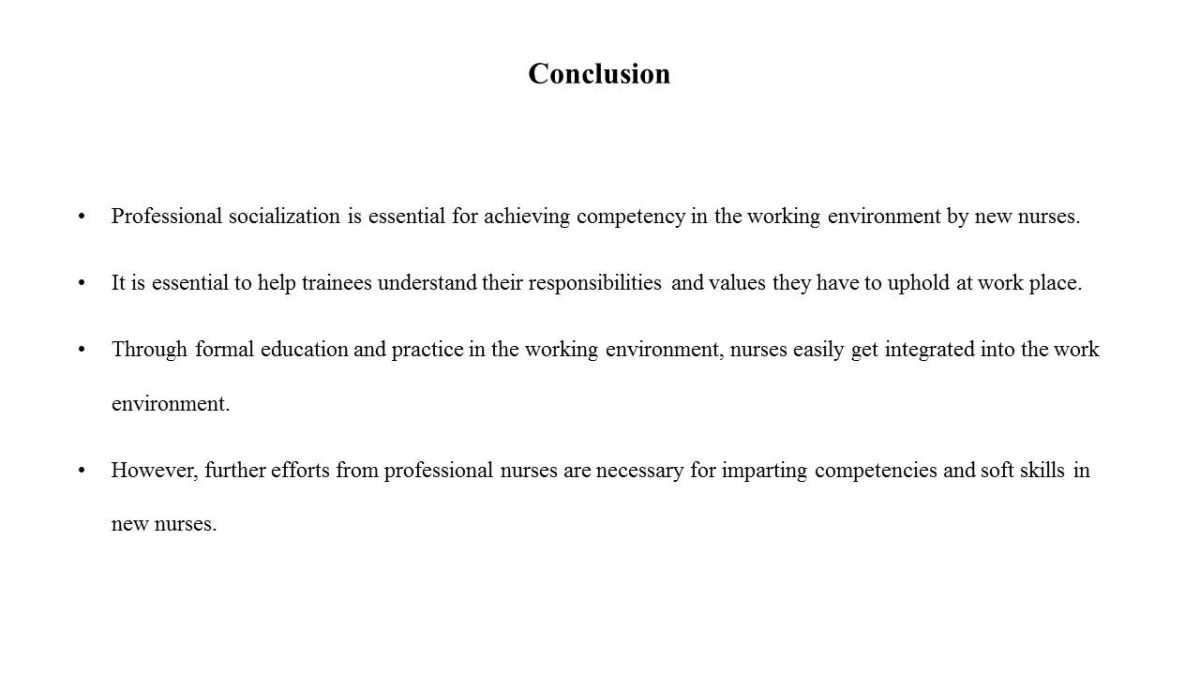
References
Masters, K. (2018). Role development in professional nursing practice. Jones and Bartlett Learning.
Maginnis, C. (2018). A discussion of professional identity development in nursing students. Journal of Perspective in Applied Academic Practice, 6(1).
Gazaway, S., Gibson, R. W., Schumacher, A., & Anderson, L. (2019). Impact of mentoring relationships on nursing professional socialization. Journal of Nursing Management, 27(6), 1182-1189.